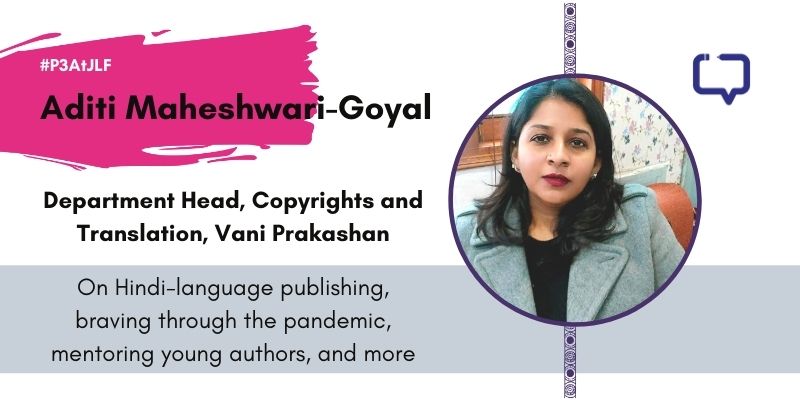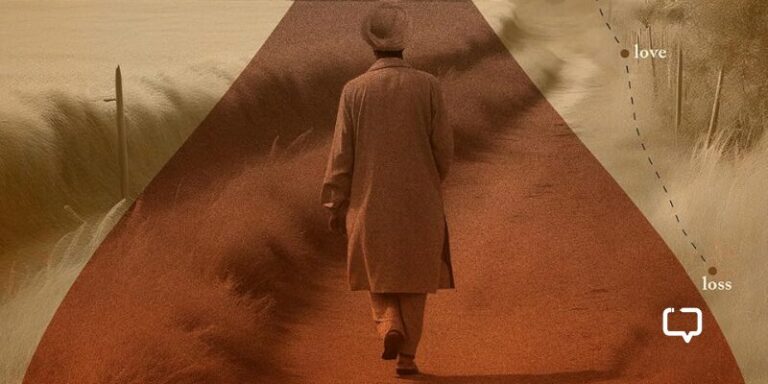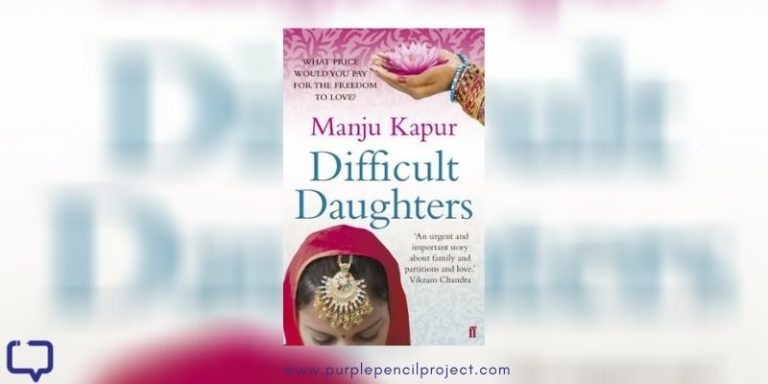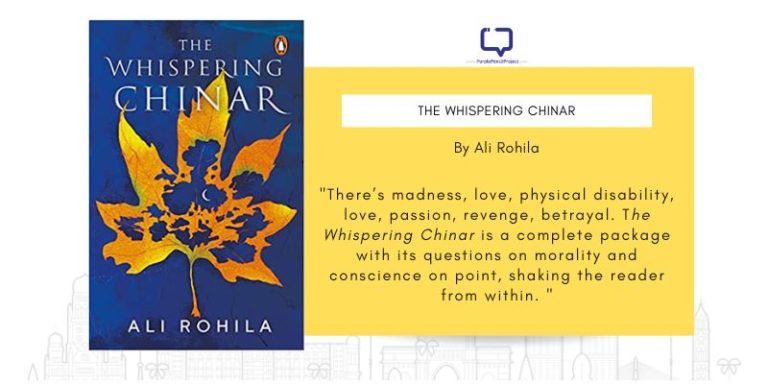Prakruti Maniar speaks to Aditi Maheshwari-Goyal, who heads the Department of Copyrights and Translation at Vani Prakashan and is the Managing Trustee at Vani Foundation, about Hindi language publishing, being a part of Jaipur Literature Festival 2022, working through the pandemic, and much more. Excerpts:
Prakruti Maniar: How excited are you for return of the Jaipur Literature Festival 2022 to be back on ground? Tell us a little bit about your relationship with the festival and do share some fond memories of your time there.
Aditi Maheshwari-Goyal: I’m literally a JLF baby, and I attended my first JLF when I was in college. From being a part of the distant audience to now working with the team on something, it’s (been) a very long journey. Of course, JLF has given the world a beautiful literature festival and a ‘brand India’. Make in India तो अभी शुरू हुआ है 4-5 साल पहले। Sanjoy, Namita ji, and William have been at it for so many years and they’re the true cultural brand ambassadors of India actually.
And the way they’ve shown the world that how a country, that is a linguistic jungle actually, can come together to put up a good show, the languages can come together and can communicate with each other on various global issues, various local issues and take those local issues to the global platform. I think that is amazing about JLF. And, of course, for two years, the Brave New World program of (the) Jaipur Literature Festival has really kept a brave face.
As somebody who’s also a producer in the literary field, as a publisher, I understand how difficult the financial system is right now for a field like ours. क्योंकि रोटी कपड़ा मकान is the top priority of everybody, किताबें, संस्कृति, साहित्य, ये सब बहुत बाद में आता है। और ऐसे में जब एक इंडस्ट्री जिसकी रोज़ी रोटी है, ये सांस्कृतिक और साहित्यिक खेमे, उनके लिए ये बहुत ही मुश्किल समय है, और ऐसे में JLF ये off-ground कर रहे हैं। I think, hats off to them, all my heart was out to them.
सच कहूं तो, देखिए दो तरह की दुनिया है JLF में। एक जो onstage है और एक जो backstage है। जब मैं audience थी, तो मैं बहुत अच्छे-अच्छे sessions सुनती थी: I used to meet authors, I used to be in awe of books, I used to look at the covers in a very different way, और जब से मैं team के साथ काम करने लगी हूं, तो मुझे समझ आता है कि कितना काम होता है backstage पर, oh my god! I mean, the amount of work JLF team puts in to make a flawless, good, important, engaging experience for audience onstage is incredible. तो जब से team के साथ काम करना शुरू किया है, तब से सही कहें तो sessions सिर्फ online ही सुन पाती हूं क्योंकि backstage इतना काम होता है।
This year at JLF, we aren’t doing book specific or author specific (lists), but we’re actually looking at language specific, public-sphere specific lists right now. So we’re looking at translations of Premchand, we’re looking at talking about books and culture and politics. I’m very excited about the Vani Foundation Distinguished Translator Award this year which we’ll be announcing very soon. It has been instituted with the Jaipur Bookmark.
And just to make this entire experience of backstage people who produce books, one translation program that goes out is Vani Foundation Program at Jaipur Bookmark. So we’re going to announce that very soon. This year has been peculiarly important because we’ve taken over the publishing division of (the) भारतीय ज्ञानपीठ and that has given us an opportunity to do a lot of good work now. So we’re looking at भारतीय ज्ञानपीठ’s list as well and it’s an amazing list. So one of the books, ओ रेहनुमा, which has been translated into English, will be launched at the Jaipur Literature Festival.
हर profession का एक kick होता है, मेरे profession का kick ye है कि हर उस manuscript को जिसको दुनिया शायद 5-10 साल बाद बहुत बड़ा मानती है, वो किताब मैंने first hand पढ़ी है, मेरे life and profession का kick यही है।
Prakruti Maniar: Especially till right before the pandemic, there were at least 300 literature festivals in India. So speaking as someone who visits a variety of them in a year, what do you think makes a good literature festival, from which readers can get the maximum value out of?
Aditi Maheshwari-Goyal: Actually, Prakruti, the problem is (that) literature festival has become a formula for a lot of people who’ve got nothing to do with books, and I find that slightly irritating now because they’ve not understood the power of curation. And about focusing on funding, just about focusing on sponsorship, does not ensure a great festival. A great festival is about in-depth understanding of books, authors, curation, (and) making everybody feel at home. So that’s something, I think not all literature festivals right now in India have understood well.
Few of them that have really been doing good work in this direction is Madhubani Literature Festival, for example, and they’re curating, brilliantly the Madhubani culture (and) language. Bihar is the focus there. So that is doing well. Recently I went to Lit Chowk in Indore. They’re doing a fabulous job because they’ve been able to focus on socio-cultural space, and books as a part of the socio-cultural space. So they’ve been able to curate something special. Then, of course, Ravi DC’s Kerala Literature Festival, that’s incredibly curated.
So the power of curation, you know, is something that needs to be focused (upon). तो वो जो literature festival formula बन गया है, I think, post-COVID, we should be focusing on why this formula is not working. Because sponsorships are not the key to literature festivals, books and authors are.
Prakruti Maniar: …I agree with you. There was a time when I would go through the speaker list of festivals happening in Mumbai, and they would be almost identical…
Aditi Maheshwari-Goyal: It’s amazing, if you see it closely, there were people who were together. And then something happened and they made different festivals in the same city. Imagine the amount of resources that could have been in one place, that would’ve served the community better. But now the resources are broken, and the community too is.
Prakruti Maniar: How is the digital helping you as a publishing house? How did you navigate that shift from in-person to online interactions over the last few years? What were the challenges you faced?
Aditi Maheshwari-Goyal: I was just checking my stats as I do on every Saturday, social media stats of all these handles. So male to female ratio is 24% (with 24%) females only. Broke my heart. Number two, we are getting audiences only from Hindi speaking states. Number three, the amount of hits. I mean, if I look at the post hits, and what worked, what didn’t work, only very populist kinds of posts are getting the maximum traction. The posts from the classical authors or the lists that we have curated, they don’t get as much traction as the populist or more fun, lighter things get attention. Makes me wonder, what is social media all about? Makes me wonder, what kind of content industry are we creating with our own endeavor each day?
Having said that, nothing can replace a personal human interaction. Although we’ve gone digital and we’ve made sure that we are populating that space with healthy, important conservable communication. We are not trying to just hit the sensation button on, among, like various news portals are. When we’re talking about content, we are talking about content that can have a shelf life.
That is the entire brief that the team works on, that content can have a revisit value. (That’s) number one. So, as far as that part is concerned, we are really looking at books, authors, that are not only, जिसको हिंदी में बोलते हैं ना कि दुर्लभ हैं, जिनसे मिलना दुर्लभ है, जिन्हें देखना दुर्लभ है, जिनको सुनना दुर्लभ है। उसमें कुछ senior authors हैं। So, number one, we tried to curate those authors online.
Now once that happened, we understood that technology is not their cup of tea. They are not comfortable with it. Let’s accept it. It’s not. It fills them with anxiety. I mean, I remember (in) 2020, when the first lockdown was announced, we announced the online lit fest. The challenge in front of us was that we can’t just have young people doing the lit fast, we need to have senior authors as well. Now the challenge was (that) they don’t know how to do social media live interactions, and they don’t know how to use these software. And then we decided, okay now, we need to make a manual. We need to organize volunteers who can help them personally.
And, so I know one senior author, you know, who called me at 2 am at night and I’ve been there with her all day, trying to tell her how Facebook live is done and how it will be streamed. Till then, streamyard (and) zoom were not a regular part of our lives the way it is now. So Facebook Live was the most easy way for them, (and) for me, to tell them that आप ऐसे कर लीजिए, ऐसे कर लीजिए। पूरा दिन उन्होंने बहुत बार practice किया, and you know, she’s 80, she’s (a) very senior Hindi author. She called me at 2am. I cried. She said बेटा मुझे ना घबराहट हो रही है कि कल ये… And I literally talked her out of her anxiety for half an hour, हो जाएगा, हो जाएगा, हो जाएगा। And वो फिर याद कर रही है छोटे बच्चे की तरह, अच्छा पहले मुझे यहां login करना है, फिर मुझे ये दबाना है, फिर ऐसे आएगा, अच्छा अब देखो ठीक हुआ ना, ऐसे किया ना? So आप सोचिए कि कितना anxiety हुआ होगा।
And it’s not nice. It’s not. At this age, they shouldn’t be going through this. But, क्या करें, situation ऐसी थी। लेकिन अब महीने बीतते गए, events होते गए, so now they’re comfortable. They’ve adapted. I’d say 99% of them have adapted. Hindi, I think, was the quickest in this pandemic to adapt to this new ecosystem. So much so that it’s become a regular part of our lives now. And आप देखिए कि हिंदी का content consume भी बहुत ज्यादा होता है, YouTube पर, especially performative parts of literature: book readings, कविता पाठ, शायरी पाठ, ये सब, बहुत कुछ चल रहा है online. So, all of a sudden, I’m seeing the entire digital demographics, because 22nd March is not far. If I have to look at Vani’s stats itself, so, from being somewhere between 50,000 to 70,000 (in terms of audience) reach, now we are playing in about 3 million to 4 million organic reach from our platforms, every day.
And I’m thinking what has happened? So उसमें ये लगता है कि maybe we are able to build an organic community in a decent way. आज दो साल बाद, जब हम pandemic (के) first lockdown की second anniversary अब देखेंगे, so if I have to look at what has Vani digital(ly) done so far, I would be able to say in one line that we’ve been able to curate decent content. That can, really, not only represent but also celebrate the Hindi public sphere in all possible dimensions. हमने दलित साहित्य भी discuss किया। हमनें स्त्री विमर्श discuss किया। हमने सतरंगी वाणी, एक imprint, launch किया जोकि dedicated ही है LGBTQ+ issues को।
We’ve launched Vani Prithvi, which is our environment and ecology imprint. We’ve launched Vani business, which talks about local धंधा in our own language, you know. The first book we did in (the) Vani business series was Startup. That has gone in second print in, like, eight months. We’ve done युगपुरुष, which is the authorized biography of घनश्याम दास बिरला जी। Then we’ve launched युवा वाणी in an official way. In the 80s, the senior generation of Vani Prakashan thought that (let’s) catch them early. In a young author, just sign them up. Because you may never know that tomorrow, so take the first risk with a bright pen. That’s what Yuva Vani is about.
That is the idea. It gets very demotivating for young authors, if they don’t get the right kind of ghetto, the right kind of industry association, they can get very disillusioned with the shortcomings. And publishing takes time, it can get testing for some people. I totally understand that. तो वो ना हो तो we tried to make युवा वाणी a very organized platform. So that was done in the pandemic. The pandemic has also given us some opportunity to sit down (and) reflect as to where all our presence was needed, as an industry body, (and) as a publisher also. Plus, it has also given us an opportunity to think of expansion.
Prakruti Maniar: Tell us a little bit about your acquisition of Bhartiya Gyaanpeeth.
Aditi Maheshwari-Goyal: It is perhaps one of the most expensive Hindi acquisitions in (the) last 70 to 75 years. Bhartiya Jnanpith was set up in 1943. So it is officially India’s oldest Hindi publishing house. Now, that becomes a part of Vani group. So now Vani’s history gets a narrative that we never thought would add to us. To come back to your point, I’m just trying to give you an entire 360° view of what pandemic has done to the content industry. It has also increased our screen time. So we finally had the undivided attention of readers during the pandemic on digital space.
And it has also given us a sense of (the) real time pulse of readers. We feel more confident about our own operations, our own decisions, our own presentation of books. And it has also given us a chance to correct ourselves where we were doing wrong, because the feedback is so real time that any business, you know, can blossom, if you work on the feedback in a positive way. It can also shrink if you become arrogant or ignorant towards the feedback. So we’ve become more aware about our feedback and it gives us an opportunity to correct ourselves where it’s needed.
Prakruti Maniar: …But the numbers have not been great.
Aditi Maheshwari-Goyal: Actually, it’s been horrible, honestly. It’s been horrible for not only us, but I feel bad for the young publishers who took a chance with their careers, who went up and put up (through everything), because publishing itself globally is not a very beneficial career. I don’t know how many families would encourage their kids to become publishers. It’s a financially difficult ecosystem. So those who have taken the risk, I feel bad for them.
Prakruti Maniar: So to conclude, what is the trend in Hindi publishing you are seeing right now?
Aditi Maheshwari-Goyal: पता है, हिंदी में, in the last one year, I’ve seen about a dozen new publishing houses, and a lot of independent booksellers too, they’re women. And I don’t know what’s happening in Hindi books, because everywhere, around the world, even in India in different language industries, we’re seeing (that) publishing houses are closing down, publishing houses are having a difficult time, of course. Booksellers are having a difficult time, of course. But all of a sudden, I’m seeing, in Hindi, there are about a dozen new publishing houses. I still have to figure out what’s happening. Maybe it’s the commissioned publishing that’s doing the trick, maybe it’s the paid publishing that’s doing the trick, I don’t know. Maybe the next decade will show that.
See, because books have become an extended visiting card. So everybody wants that: a book to their name now. It’s become the new thing. With small publishing houses, I don’t know where this list would go. In (the) next five years, we’ll see what happens to these books, these paid books. But as far as this new Hindi movement is concerned, I’m pretty surprised, and happily surprised, that (in the) Hindi scene, (there’s a) resurgence of publishing, may be in smaller, but important pockets.
Aditi Maheshwari-Goyal will be a part of the Jaipur Literature Festival 2022 as a speaker.



















